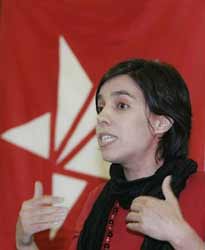Spanish State: After the abdication of the king, it's time to checkmate the regime
VIVAS Esther
 The regime is collapsing, it is dying and in its last-ditch struggle to survive, the king has abdicated. Never has the regime resulting from the Transition [1] been as widely challenged as it is today. The pillars on which it rests, the monarchy, the judiciary, bipartisanship, have been greatly delegitimized for some time now. We no longer believe in their lies, those lies with which they are trying to hold together a system that is falling apart. What seemed not so long ago impossible appears today as a reality. Let us push with all our might to widen even further this breach that the economic, social and political crisis has made possible.
The regime is collapsing, it is dying and in its last-ditch struggle to survive, the king has abdicated. Never has the regime resulting from the Transition [1] been as widely challenged as it is today. The pillars on which it rests, the monarchy, the judiciary, bipartisanship, have been greatly delegitimized for some time now. We no longer believe in their lies, those lies with which they are trying to hold together a system that is falling apart. What seemed not so long ago impossible appears today as a reality. Let us push with all our might to widen even further this breach that the economic, social and political crisis has made possible.
Since the elephant hunt of his "majesty" in Botswana, through the indictment of his son- in-law Iñaki Urdangarín in the "Noos affair" and the involvement of the Infanta Cristina in this case, and including the many operations on the monarch's hip, costing millions and paid out of public funds, the Royal House has become a caricature of itself. One of the main justifications of "democracy" is mortally wounded, but it is not dead yet.
The announcement of the royal abdication is a final, desperate attempt to save the situation; an attempt at a "facelift" with the aim of restoring legitimacy not only to the monarchy but also to its suite of judges, politicians and opinion formers. For years, far too many years, they have lived under the shelter of this false Transition, trying to efface or hide our collective history. Our forgetfulness has been the substrate of their victory, not only moral but also political and economic.
The economic crisis, transformed into a profound social and also political crisis, has put the king and the regime of 1978 on the ropes. People have said "basta". We saw it three years ago with the emergence of the 15-M Movement; with the spread of civil disobedience; with the occupation of empty homes that were in the hands of banks, and all of that that with broad popular support despite the criminalization of protest. More poverty means more pain, but thanks to these mobilizations it also means greater awareness of who are the winners in this situation - the bankers, the politicians – and who are the losers.
The rising demand for sovereignty in Catalonia has also thrown the regime on the ropes, highlighting the deeply anti- democratic nature of a Constitution that does not allow the right to self-determination. Today, the European elections have given the "coup de grace" to a decaying regime, with the loss of more than five million votes for the PP and the PSOE and the emergence, with the election of five members of parliament, of "Podemos". The regime is becoming nervous, very nervous.
The royal abdication is the latest rescue manœuvre. But we must nevertheless remember that the system still has room for manœuvre. The abdication of the king illustrates the weakness of the pillars of the regime and the strength of the people. But we do not want Juan Carlos Felipe [2] either. It's time to go out into the streets to demand the opening of constituent processes throughout the Spanish State, in order to decide what kind of future we want. We must go on the offensive in order to checkmate the regime.
Notes
[1] The Transition is the name given to the political process following the death of Franco, which culminated in the Constitution of 1978
[2] Juan Carlos Felipe is the Crown Prince

